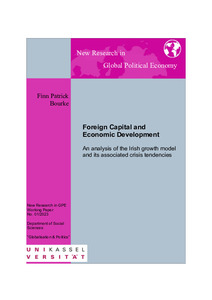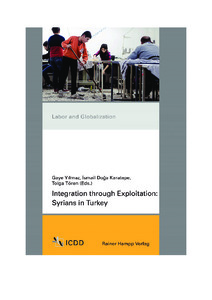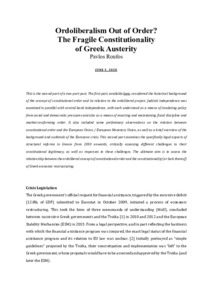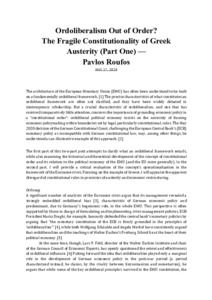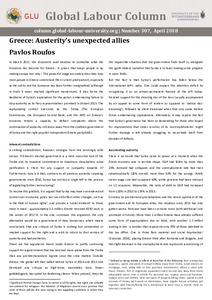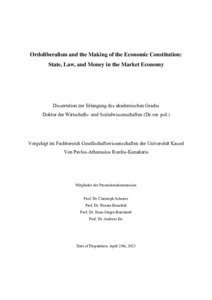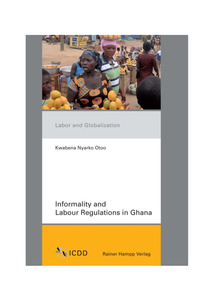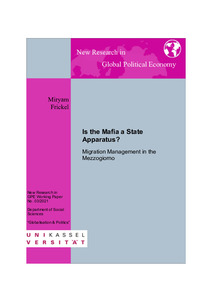Suche
Anzeige der Dokumente 1-10 von 83
Working paper
 Foreign Capital and Economic Development
Foreign Capital and Economic Development
(2023-07)
The Irish political economy is notable for the sustained and central role of foreign investment in driving economic growth, notably via the commercial activities of multinational corporations, and more recently financial services. Beginning in the 1950s, the Irish state began to move away from its protectionist policies of import-substituting industrialization, and transitioned towards a liberalized, export-led industrialization model of economic growth in order to achieve its developmental catch-up. This has resulted ...
Beitrag zu Periodikum
 Europe’s authoritarian shift
Europe’s authoritarian shift
(2023)
The European Union prides itself for being a legal order and a supranational organisation created through, and organised around, a specific institutional framework and an ordoliberal-inspired “rules against discretion” approach. Theories of ‘integration through law’ abound and the European Monetary Union (EMU) remains a unique common currency area structured within a constitutional framework. Officially, the formal priority of treaties, mandates and the European legal framework are presented as the sine qua non of ...
Dissertation
 Spekulatives Kapital und chinesische Auslandsübernahmen
Spekulatives Kapital und chinesische Auslandsübernahmen
(2024)
Warum nahmen die Unternehmensübernahmen chinesischer Investoren in Deutschland und der EU ab 2011 zu und stiegen zwischen 2015 und 2017 besonders stark an? Diese Studie beantwortete diese Frage, indem sie empirisch die folgenden drei Themen untersuchte: die chinesischen Investoren, die zwischen 2011 und 2019 deutsche Unternehmen übernommen haben, die Entwicklung des chinesischen Finanzsektors zwischen 2009 und 2017 und die M&A-freundliche regulatorische Umgebung während der Amtszeit des 18. Zentralkomitees der ...
Buch
 Integration through Exploitation: Syrians in Turkey
Integration through Exploitation: Syrians in Turkey
(Reiner Hampp Verlag, 2019)
This book is about the largest displacement crisis and resettlement of our time. However, it is not another piece that elaborately describes the appalling situation of Syrian workers in Turkey, but explores how they are integrated into the lower ends of the value chain in several sectors. The book seeks answers of what has been largely overlooked in the literature on the question of how labor processes have been shaped in various labor-intensive sectors by class and identity.
Aufsatz

 Ordoliberalism Out of Order? The Fragile Constitutionality of Greek Austerity (Part Two)
Ordoliberalism Out of Order? The Fragile Constitutionality of Greek Austerity (Part Two)
(2020-06)
This is the second part of a two-part post. The first part, available here, considered the historical background of the concept of constitutional order and its relation to the ordoliberal project. Judicial independence was examined in parallel with central bank independence, with each understood as a means of insulating policy from social and democratic pressures and also as a means of enacting and maintaining fiscal discipline and market-conforming order. It also included some preliminary observations on the relation ...
Verschiedenartige Texte

 Ordoliberalism Out of Order? The Fragile Constitutionality of Greek Austerity (Part One)
Ordoliberalism Out of Order? The Fragile Constitutionality of Greek Austerity (Part One)
(2020-05)
The architecture of the European Monetary Union (EMU) has often been understood to be built on a fundamentally ordoliberal framework. [1] The precise characteristics of what constitutes an ordoliberal framework are often not clarified, and they have been widely debated in contemporary scholarship. But a crucial characteristic of ordoliberalism, and one that has received comparatively little attention, concerns the importance of grounding economic policy in a “constitutional order”: ordoliberal political economy insists ...
Verschiedenartige Texte

 Greece: Austerity's unexpected allies
Greece: Austerity's unexpected allies
(2018-04)
Contrary to pre-electoral proclamations and the recent optimism of the government and its European allies, the situation since 2015 has only gotten worse. Pensions have been cut twice more (with additional cuts promised in future). More than 1 million Greeks have already suffered some form of appropriation due to debt, with another 1.7 million waiting in line - a number that represents only 70% of those indebted to the tax office. One in three face material and social deprivation (Eurostat, 2016), placing Greece third ...
Dissertation

 Ordoliberalism and the Making of the Economic Constitution: State, Law, and Money in the Market Economy
Ordoliberalism and the Making of the Economic Constitution: State, Law, and Money in the Market Economy
(2023)
The aim of my research is to explore the political economy of ordoliberalism in its historical trajectory. Beginning from the years of its inception during the interwar period, the dissertation focuses on the specific conditions and political economy of the Weimar Republic as the framework within which the ordoliberal framework was developed. Moving on to the postwar period, the dissertation examines the attempts of operationalization of the ordoliberal framework within the context of West Germany and the social ...
Buch
 Informality and Labour Regulations in Ghana
Informality and Labour Regulations in Ghana
(Rainer Hampp Verlag, 2019)
The book makes a major contribution to the controversy about the factors driving the persistence and expansion of the informal economy. Unlike most others studies which either take a structuralist or an actor’s choice approach to the topic, this study combines a careful assessment of the economic, social and political circumstances promoting informality with a meticulously carried out econometric analysis of the dominant characteristics of workers as well as enterprises in the informal economy
in comparison to those ...
Working paper
 Is the Mafia a State Apparatus?
Is the Mafia a State Apparatus?
(2021-12)
Starting from the relations of production, this paper examines the role of mafia for the preservation of social power and class relations in Sicily. To this end, the concept of the informal state apparatus is introduced. Following the approach of Critical Grounded Theory, this paper proposes to fill explanatory gaps in conventional mafia research by means of Nicos Poulantzas’ historical materialist state theory. In-depth field research confirms the systematic generation of irregularity through conditions in which it ...

